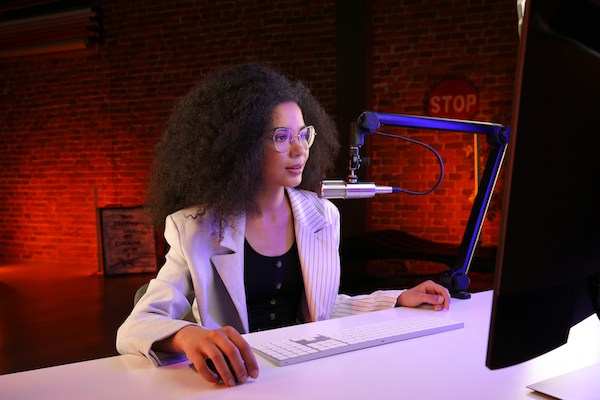Technology has dramatically reshaped the media landscape, particularly for LGBTQ+ and BIPOC communities. As digital platforms evolve, they offer unprecedented opportunities for diverse voices to influence cultural narratives and representation. Here’s an exploration of how technology is revolutionizing media creation and consumption for these communities.
Transformation in Media Creation and Consumption
Digital tools have democratized media production, allowing marginalized voices to create and share content without the gatekeeping traditionally imposed by mainstream media.
“The biggest thing that technology has done is it’s really connected people. You’re no longer limited just to, you know, your specific area and your specific people that you know in person,” says Lu Calzada, NBCUniversal & Comcast Digital Equity Voices Lab Fellow and Journalist at the Windy City Times. “It is such an important process for queer and BIPOC communities. Because if you’re in an area with not a lot of people who look like you and who identify like you, it can lead you to feel isolated.”
The rise of affordable technology and social media platforms has enabled a wider range of voices to participate in media, breaking down barriers and fostering a more inclusive environment.
Amplification of Voices
Digital platforms like YouTube, Instagram, and TikTok have given rise to influencers and content creators who bring authentic perspectives to their audiences. For instance, popular creators such as actress Laverne Cox on Instagram and musical artist Janelle Monae on X (formerly known as Twitter) use their platforms to discuss issues pertinent to LGBTQ+ and BIPOC communities, raising awareness and sparking conversations that might not otherwise reach mainstream audiences.
Social Media’s Role in Shaping Narratives
Social media allows LGBTQ+ and BIPOC individuals to challenge stereotypes and assert their own identities in ways that traditional media often fails to do. Platforms like X and Facebook have become battlegrounds for advocacy, allowing users to mobilize around causes, share personal stories, and call out misrepresentation.
“I think a lot of queer & BIPOC media professionals who are cultural critics have really been able to amplify their voices through platforms like Instagram, X, and TikTok. That’s how I found so many queer reporters that I follow. When I think of really great information about the legislative landscape, I think of Erin in the Morning’s newsletter,” says Calzada. “I discovered her newsletter on social media, specifically via her X. That’s also how I found BIPOC creators on Instagram who are covering issues, either in their home countries or in the United States… And those things are really important to me!”
Impact of Streaming Services and Digital Content
Streaming services such as Netflix, Hulu, and Prime Video enable content creators to produce work that reflects the true diversity of experiences. Shows like Pose and Master of None offer nuanced portrayals of LGBTQ+ and BIPOC characters, challenging traditional media narratives and providing a platform for authentic storytelling.
Challenges in Digital Spaces
Despite the advancements, LGBTQ+ and BIPOC media creators face several challenges. Navigating tech platforms can be difficult due to issues like algorithmic bias, censorship, and lack of representation in tech development. These challenges can hinder visibility and create barriers for creators who seek to share their work with a broader audience.
Across digital platforms, BIPOC & queer media professionals frequently face targeted hate and harassment, including derogatory comments and discriminatory abuse, which can hinder their ability to share their work and impact their mental health. This online hostility not only attacks their personal identities but also aims to stifle their voices and contributions within the digital media space.
“Online hate and trolling can really make you not want to go to work. This climate of hate makes us as BIPOC and LGBTQ+ journalists need to be really powerful people to push through that. And we shouldn’t be asking that of everyone,” Calzada exclaims. “We shouldn’t live in a world where you can only be a queer BIPOC media persona or reporter if you have the grit and the power to withstand all this hate, that shouldn’t be a prerequisite.”
Addressing Censorship and Misrepresentation
Technology can also be a tool for addressing censorship and misrepresentation. Leveraging digital tools to build independent platforms and communities can help bypass traditional media gatekeepers and advocate for more accurate representation. Initiatives like independent online magazines and community-driven content platforms provide spaces for diverse voices to flourish without the constraints imposed by mainstream media.
The intersection of technology and culture has opened new avenues for LGBTQ+ and BIPOC media creators, transforming how media is created, consumed, and shared. While challenges remain, the power of digital platforms to amplify diverse voices and reshape cultural narratives continues to drive progress. As technology evolves, it holds the potential to further democratize media and foster a more inclusive and representative media environment.



